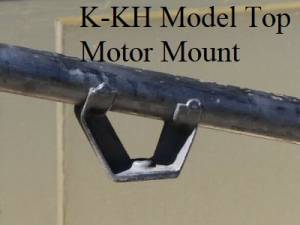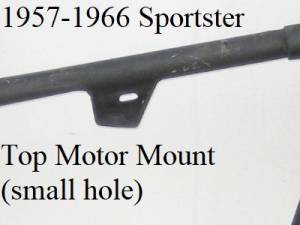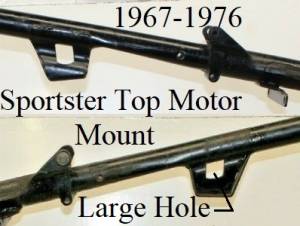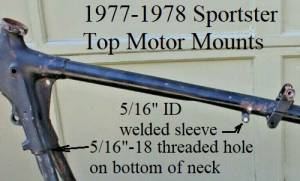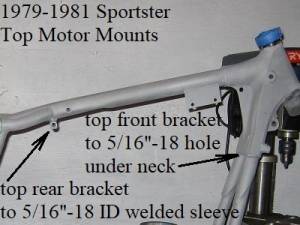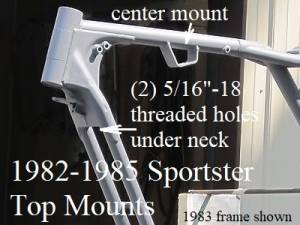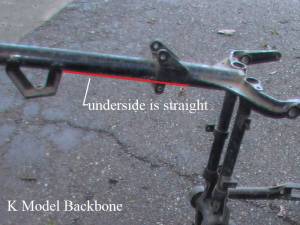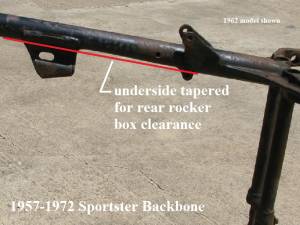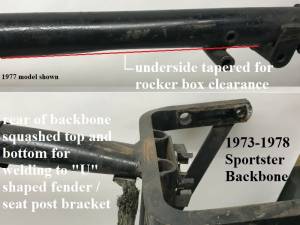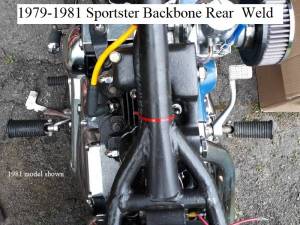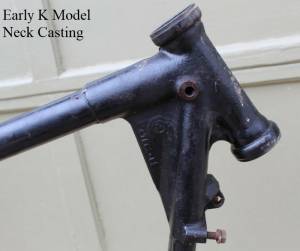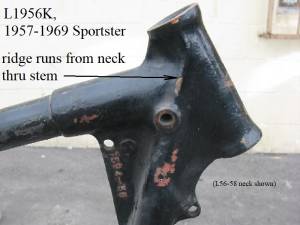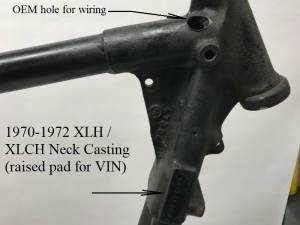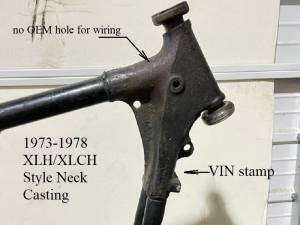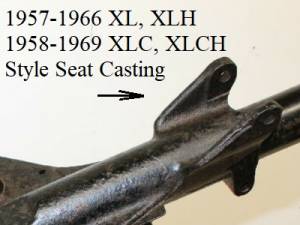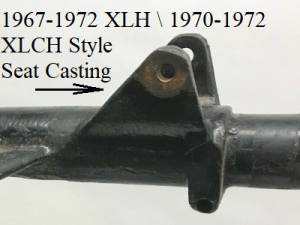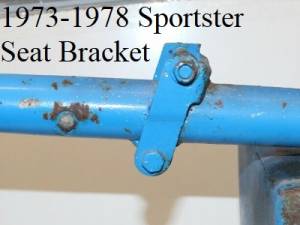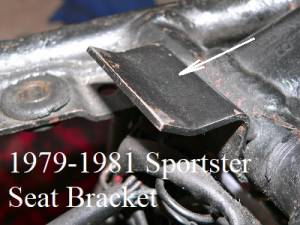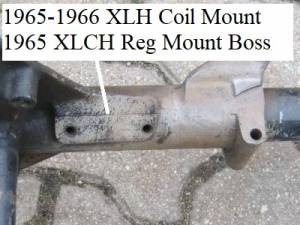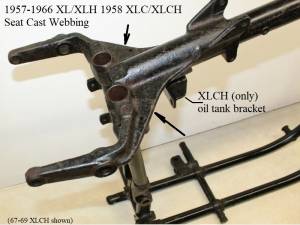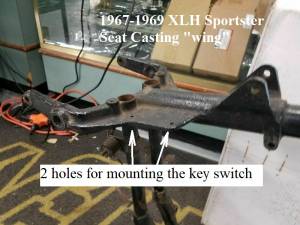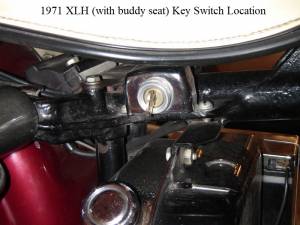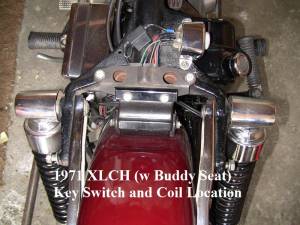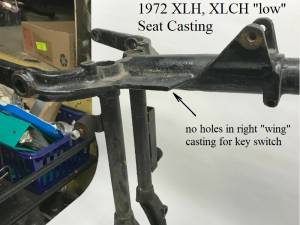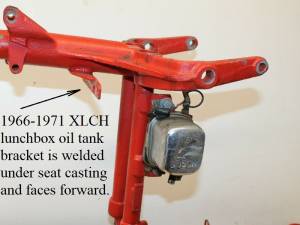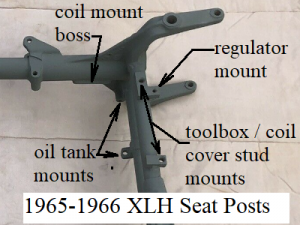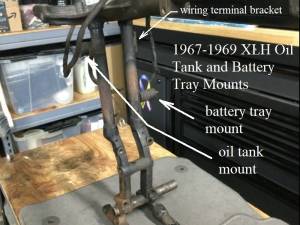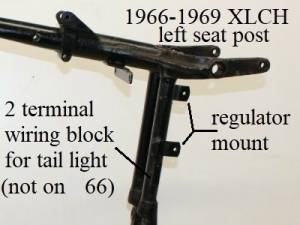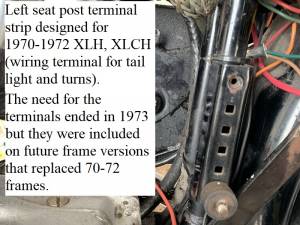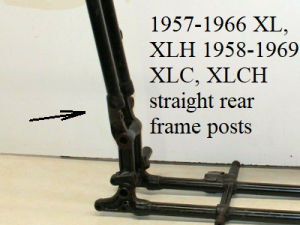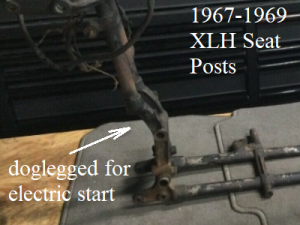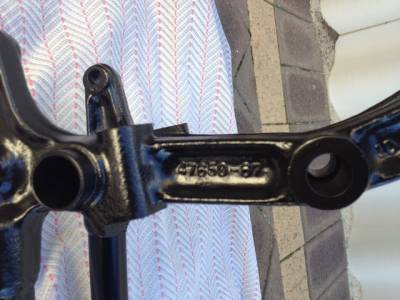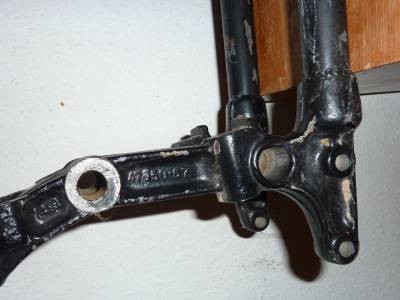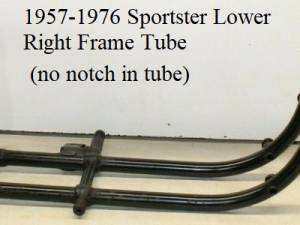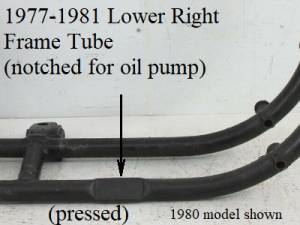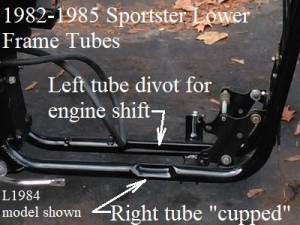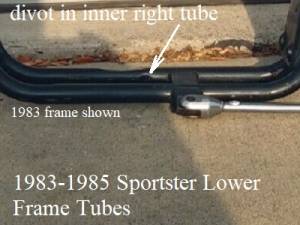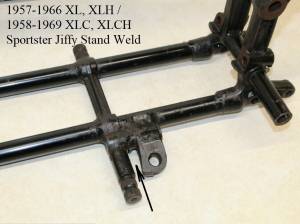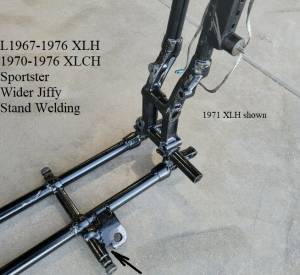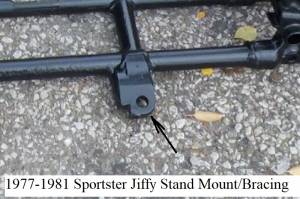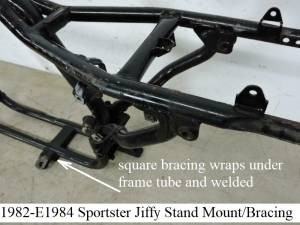Table of Contents
This is an old revision of the document!
IH: Body Parts - Sub-01W
Ironhead Frame Identification
Note: For more specifics on K models , search the Harley K Model site.
You can also download a PDF of their frame and casting specific information by clicking the link HERE.
General K Model information is listed below for differentiating those from XL Sportster frames.
Many first generation changes to these frames were reproduced but not used on future frame versions.
The purpose was to be able to replace older frames with the newer versions.
Click Here for the main Ironhead frame page with part number interchangeability.
This page is more for visual differences in frames. See the year model information in the sub docs below for more specific pics and information.
Backbone
Top Center Motor Mount
The easiest way to tell if you have a K or KH (52-56) and not a Sportster frame at a glance is to look at the top motor mount bracket, also called the “engine steady.” 1)
- K and KH model top motor mount bracket is a cast piece and is open to either side. Some K model top motor mounts have casting numbers. Some do not.
- The Sportster bracket (from 57-76) is made from stamped steel and looks like an open-sided box on the right side.
- 1957-1966 Sportster top (center) motor mount bracket has a small “pill” shaped hole through the center.
- 1967-1976 Sportster top (center) motor mount bracket has a larger more “square” hole through the center.
However, there were some early 1967 XLCH carry over frames that did come with the early top mount.
- 1977-1978 Sportsters do not have a center welded motor mount bracket but has two mounting points on the top (top front and top rear).
- The top front bracket (16265-76) is an “L” shaped piece with 3 mounting holes bolted to the engine and the neck.
It attaches to the front two rocker cover studs and under the frame neck by a 5/16“-18 bolt into a threaded hole on the bottom of the neck - The top rear motor mount on the backbone is a 5/16” ID welded tube in front of the seat bracket.
- 1979-1981 Sportsters use the same mounting points as in 77-78 except the top rear mount is in a different spot on the frame.
- The top front bracket (16265-76) is an “L” shaped piece with 3 mounting holes bolted to the engine and the neck.
It attaches to the front two rocker cover studs and under the frame neck by a 5/16“-18 bolt into a threaded hole on the bottom of the neck. - The top rear motor mount on the backbone is a 5/16” ID welded tube in front of the rear tube welding points on the backbone.
- 1982-1985 Sportsters went back to using a welded center motor mount bracket instead of a rear and still kept a top front motor mount.
- The center mount is welded piece of steel that's bent at 90° on the two bottom bends (box shaped on bottom without sides).
- The top front motor mount has 4 bolts and attaches to both the rocker box and to two 5/16“-18 threaded holes under the neck.
Backbone Profile
- Rocker Box Clearance:
- K Models have a straight backbone tube end to end.
- L1956-1976 K Model / Sportsters have a “smashed” underside of the backbone to make room for the rear rocker box.
The underside of the back bone is tapered starting from the front of the seat casting to the motor mount. - 1977-1981 Sportsters also have the tapered underside of the backbone from the top rear motor mount past the area over the rear rocker box.
- 1982-1985 Sportsters had a frame design raising the backbone which removed the need to taper the underside for rocker box clearance.
- Backbone Rear Welded Area:
- 1957-1972 models have a forged seat casting where the backbone and seat posts slip into it to be tacked and silver brazed.
- 1973-1978 models have a “U” shaped square stock where the backbone and seat posts are welded to.
The backbone is squeezed inward top and bottom to mate to the height of the “U” bracket for welding. - 1979-1981 models have a “tee” junction where the backbone is squashed and welded into the side of another pipe.
- 1982-1985 models have a straight backbone butted to a curved tube that runs down to the lower tubes.
See pics above also for 79-85.
Neck
Neck Profile
On pre-73 Sportsters notedly XLH, the hole up front on the right side of the tube is for the wiring bundle from the forks to run into. 12)
The wiring runs through the frame backbone and exits at the mid point for the switch wiring.
Then the remainder of the wires exit at the tail end of the tube, going to the battery, relays and etc.
The entire top tube was hollow for the length of it on all frames through 1972.
Then in 1973, the frame changed and this tube hole was mostly closed off (although a smaller hole is reportedly on the rear tube area on some 73-78 frames).
The factory got rid of the casting and welded a U-shaped metal plate over the end of the top tube to attach the rear shocks on 73> models.
You may find post 72 necks / frame tubes with (owner drilled) holes to retro the main wiring through the backbone to clean up the look.
Neck Casting Numbers 1957-1969
Neck Casting Numbers:
- On the neck web of an early Sportster frame, you should find a casting number.
- Casting numbers ending in -52 are for 1952-1953 K Model frames.
Possibly 52 & 53 Ks used non welded -52 neck casting frames. - Casting numbers ending in -52A are for possibly L1954-E1955 K Model frames.
Possibly 54 Ks had welded -52 neck or -52A neck castings. - Casting numbers ending in -56 are for 1956-Up K Model and all Sportster frames. 17)
- Early 1956 K neck casting does not have a “stem ridge” (diagonal line extending thru the stem).
- Late 1956 K and 1957-Up XLH casting does have the “stem ridge”.
Click on a pic to enlarge:
| Found on K Model, Casting -52 18) |
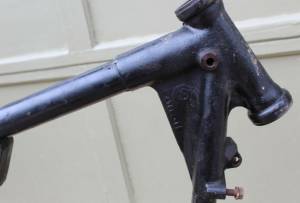 |
| Notice the different gas tank mount hole to number positions and webbing height between XLH and XLCH. (Note: extra hole on orange frame below owner induced). Painted surfaces can sometimes skew the numbers to look differently. |
||
| Found on 67-69 XLH, Casting (-56) 19) | Found on 67-69 XLCH, Casting (-56) 20) | Found on 67-69 XLCH, Casting (-56) 21) |
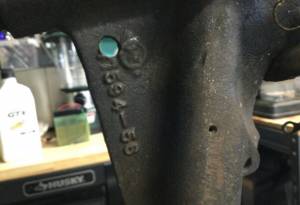 | 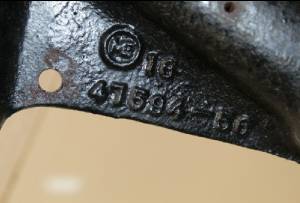 | 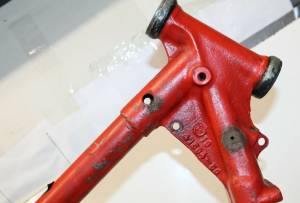 |
Frame VIN Numbers
Click Here to reference Motor and VIN numbers in the Sportsterpedia.
- 1957-1969 Frames:
57-69 models do not have any VIN numbers.
Different parts on the frame may have casting / part numbers in many places but none of these relate to a VIN number or frame part number for that matter.
Neither do they refer to a specific year of frame. Many parts of different year frames carry the same part number pieces.
The only type of serial number for the purpose of ownership was the numbers stamped into the engine case. - 1970-Up Frames:
In the 70s, Harley started putting the VIN on the right down tube (from then on the bikes were titled by the frame instead of the motor).
If your frame has a VIN on the neck, it was made in the seventies or later.
Reportedly some 1969 models received a blank boss on the neck but did not come with a VIN stamped there.
Seat Casting \ Brackets
Seat (front) Bracket
- 1957-1966 XL, XLH and 1958-1969 XLC, XLCH will have the older style seat casting with the seat bracket “Leaning” forward.
- 1967-1972 XLH, 1970-1972 XLCH will have the seat casting with the “Pyramid” shaped seat bracket.
- 1973-1978 Sportsters no longer use steel casting for the seat mount.
It was replaced with steel straps covering the each side of the frame tube with open holes to hold the support for the seat. 22)
A steel bracket assembly is welded to the backbone. - 1979-1981, the frame changed drastically in the area of the seat and includes a sub frame assembly in the rear behind the seat posts.
The newly designed oil tank that doubles as a battery tray sits inside the sub frame.
The seat bracket changed to more of a wide hook instead of a fastened connection attached facing the rear.
Coil / Regulator Mount Casting 65-66 XLH, 65 XLCH
- 1965-1966 XLH frame had a special location for the spark coil.
The right underside seat casting was modded to include a flat bossed area at 45° with two threaded holes for the coil bracket.
The angled bracket is bent to run under the frame to the left side where the coil is attached. - 1965 (only) XLCH used Bosch 12v regulator that was mounted between top of the horseshoe oil tank and the frame. 27)
The right side seat casting was modded to include the same flat area at 45° with two 1/4”-28 threaded holes to affix the regulator bracket.
It used a 1 year only bracket that attached to the under-seat frame casting.
For 65 only, the regulator moves away from the top of the generator and is actually bolted above the tool box, left hand side hence special frame bracket and/or moded casting. 28)
But that bossed area was included on 66-69 XLCH frames without the holes threaded.
Earliest known appearance according to the K Model site is April of 1964. Present through 1966 on XLH and may be through 1969 on XLCH.
Later models may have still had this casting but reportedly the holes were not threaded since newer models didn't use them.
Even though the casting began to appear on frames in late 1964 in anticipation of the new mounting locations;
The regulator wasn't mounted there until the 1965 model year when the switch was made to the 12v system. 29)
Seat Casting Larger Webbing (right side)
- 1967-1971 XLH and 1970-1971 XLCH had a larger web in the casting on the right side to mount the key switch.
There are two holes in the “wing” or “whale tail” to mount the switch.
- In 1972 the MoCo introduced a “low” version XLH and XLCH which also included a more slimline seat which wouldn't clear the switch and coil in there current positions.
So the switch was moved to the motor mount bracket between the cylinders on “low” versions. - Mid 1971-1972 versions with the standard seat had an option for a “low” kit (52020-71) which moved the switch under the “wing” on the seat if so desired.
Drilling the wing portion of the seat casting had to be done to accommodate the new switch position.
So there may be 3 holes in the wing portion on some models. Factory “low” versions will not have any holes in the wing. - Click the link above for 1970-1972 frame pics for more information on the “low” versions.
Oil Tank Bracket (XLCH)
1966-1969 XLCH frames have the “Lunchbox” oil tank bracket under the seat casting.
- 1966-1971, the angle bracket is welded to the seat casting with the inside angle facing the front.
- 1972-E1973, the angled bracket (62554-72) is bolted with two bolts under the seat casting and the inside angle faces the rear.
Seat Casting Date Code (1957-1972)
Seat casting date codes were introduced sometime in the K Model years.
According to Harley K Model site, 1952 K model frames don't have date codes, and only the last few months of 1953 had them.
So roughly in L1953 is when date codes first appeared.
The date code reflects when the frame was made, not when bike was assembled. 36) Therefore it is yet just another tool to distinguish between year models.
1970-1972 (and possibly later frames) still have date stamping numbers but they are not normally used to distinguish the year of the frame.
A VIN number is stamped into the neck and that is what determines the year model in the legal sense.
Of course when mods have been done to them, further discover will have to be done.
1957-1969 models DO NOT have VIN numbers. So to chase down the year model of the frame, several methods of deducing must be done.
Generally, on the seat casting ear for the gas tank mount on the right hand side, you'll see a letter and digit.
The letter is the month, the digit is the year. Example; C6 = March of 1966, , C7 = March 1957 or March 1967 frame.
Sometimes the code is stamped the other way around (letter/digit or digit/letter).
However, this is not the only number that matters for dating the frame.
You can distinguish the 57-59 frames from the 67-69 by the seat castings, which are quite different.
Each frame would have uniquely identifiable features also. 37)
Harley switched production over to the new model year in late summer. So a frame manufactured in November of 1953 would have been used on a 1954 K Model.
The 1954's were already showing up in dealerships by November of '53 and etc.
The date code may not precisely ID the whole frame but it's a tool as are other ID methods described on this page.
The year certain models were introduced for instance;
1957 XL only model produced that year.
1958 XL, XLH, XLC and XLCH were the street bikes produced.
1959 XL, XLH and XLCH were the only street bikes produced.
So if you have a J7 XLCH frame (XLCH wasn't made in 1957 so) it is an October 1967 date code which dates it being made in the 1968 production year.
| 1957-1972 Seat Casting Date Code - Month and Year | |||||||
| A | January | G | July | 0 * | 1960 or 1970 | 6 | 1966 |
| B | February | H | August | 1 * | 1961 or 1971 | 7 * | 1957 or 1967 |
| C | March | I | September | 2 * | 1962 or 1972 | 8 * | 1958 or 1968 |
| D | April | J | October | 3 | 1963 | 9 * | 1959 or 1969 |
| E | May | K | November | 4 | 1964 | * requires further identification |
|
| F | June | L | December | 5 | 1965 | ||
The first two pics below also show a hole thru the backbone in front of the seat bracket for the small gas tank.
If that hole has a sleeve in it, it's an XLCH frame (or at least that portion of the backbone is). 38)
The XLH had no hole there originally and if someone drilled it, it is not likely to have the sleeve.
- In the first example pic below, a J7 on an XLCH frame would indicate 1967 since XLCH wasn't made until 1958.
- In the second pic, the A9 was further diagnosed to a 1969 frame.
- The third pic below is of a 6B stamp which is the same as B6 - February 1966.
- The fourth pic is 7L stamped upside down which is the same as L7 - December 1957
- The fifth pic is stamped C1 on a 1971 XLCH.
Seat Posts
Attachments to XL, XLH Seat Posts:
- 1957-1964 XLH frames:
- There are 2 bosses on the left post for mounting the coil and a “Wedding Band” strap on the right post for the oil tank bracket.
- 1965-1966 XLH frames:
- There are three bosses on the left seat post (two for mounting the toolbox/ coil cover with the third being for fastening the top voltage regulator mount tab.
The coil was moved and the mounting bracket for it is attached to a boss under the right seat casting.
These also have the “Wedding Band” strap on the right post for the oil tank bracket.
- 1967-1969 XLH Frames:
- There is one threaded bung welded on the upper right seat post (rear) for attaching the oil tank via a rubber mounting stud.
The left seat post has only one threaded bung welded lower (left side) to attach the battery tray via a rubber mounting stud.
Also on the left post is a two hole threaded plate welded up closer to the top for a two wire terminal strip for tail light wiring (both +wiring with tail light grounded to frame).
“Wedding band” oil tank strap moved higher and to the rear on the right seat post.
- 1970-1972 XLH frames:
- The welded boss on the left post for the two wire terminal strip was replaced by a larger one piece channel placed on the lower end for mounting the battery box.
There are 4 square holes in center of the channel and 2 threaded holes (1-top and 1-bottom)for the battery tray.
The top hole is not used for the XLH battery tray but is for the XLCH battery tray.
The 4 square holes get plastic anchor nuts and screws for attaching tail and turn signal wires (all +wiring with components individually grounded to frame).
Attachments to XLC, XLCH Seat Posts:
- 1958-1965 XLC, XLCH have no bosses or brackets for coil or regulator mounts. 44)
- 1966-1969 XLCH frames:
- 1966-1969 CH left seat post has two regulator mounting tabs off the back of the post. 45)
- 1967-1969 CH also has a (two terminal) wiring block for the tail light welded below the bottom regulator mounting tab.
- 1966 CH has no terminal block boss below the regulator mounting tabs.
Straight or Doglegged Posts:
- 1957-1966 XL/XLH and 1958-1969 XLC/XLCH models all have basically straight seat posts.
- 1967-up XLH and 1970-up XLCH models have a dogleg (or kick back).
- In 1967, Harley introduced the first electric start Sportster (two years after the Electra Glide). 50) Only the XLH model got the upgrade.
In order to accommodate it, the seat posts had to be modified to make room for the electric start motor and a much larger battery.
So the 1967 XLH had a whole new frame with a big battery, voltage regulator behind the battery and a coil under the seat. 51)
- In 1970, the XLCH was built using a battery for the first time (smaller battery than the XLH).
The XLH and XLCH now shared the same need for the seat posts to be kicked back to accommodate a battery.
Rear Motor Mount (forgings)
These are forged rear engine mounts at the bottom of the frame, also known as “Tomahawks” used from 57-81.
There are casting numbers below the swingarm pivot. The same tomahawks were used on several different year and model Sportsters.
Below are numbers per year/model Sportsters (more information is need).
| Year/Model | Number Below Right Swingarm Pivot | Number Above Right Swingarm Pivot | Number Below Left Swingarm Pivot | Number Above Left Swingarm Pivot |
| 1965-1966 XLH 1967-1969 XLCH | 47650-52PA (P above dash) (A below dash) | 47652-52PA (PA below dash) | ||
| 1967-1980 XLH | 47650-67 | 10 | 47652-67 | |
| 1977 XR-750 54) | 47650-67 | 14 | ||
| 1980 XR-750 55) | 47650-67 | 47652-67 |
| Early model tomahawks (47652-52 PA, right) (47652-52 PA, left) 56) | |
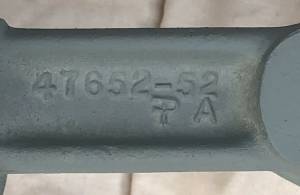 | 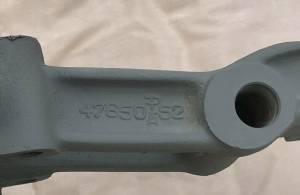 |
Lower Frame Tubes
Divots in Tubes
- 1957-1976, lower tubes (both) are straight tubes.
- 1977-1981, lower right tube is notched (pressed) to allow the (new in 77) gerotor style oil pump to be removed and installed without removing the engine.
- 1982-1985, both lower tubes changed. The engine got shifted to the left slightly and the lower tubes were massaged to accomodate the engine shift.
- The left tube was dimpled on the inside track near the engine to allow the engine to move toward the left and not bind into the frame.
- The right divot was “cupped” instead of the pressed look to allow the oil pump to lower after the engine shift.
Jiffy Stand Mounts
Around mid 1967, the jiffy stand bracket was reinforced with additional welding to the peg mount.
1957-E1967 frames do not have the extra reinforcement welding.
1977-up frames do not have foot peg mounts. 77-up footpegs mount from studs bolted into the engine case.

